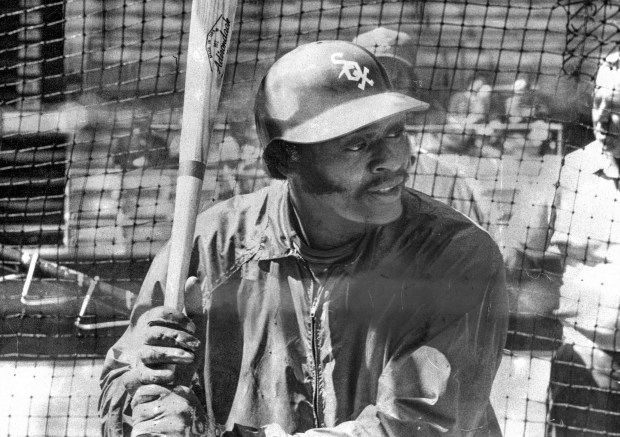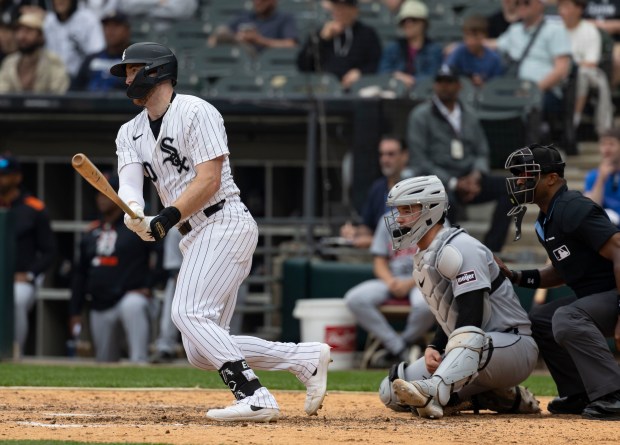It’s been a big week for the Chicago White Sox, though it has nothing to do with what happened on the field.
The team announced Monday that longtime organist Nancy Faust — who stepped away from The Rate (then known as U.S. Cellular Field) in 2010 after 41 seasons — will return Sunday, Mother’s Day, in the first of six appearances at the ballpark this season.
Then rumors spread Thursday that newly named Pope Leo XIV, who was born in Chicago, is a White Sox fan who attended a game during the 2005 World Series. His brother confirmed the fandom to the Tribune.
So what would Faust play for the pontiff if he were at a White Sox game?
“My kind of Pope that Leo is,” she replied, to the tune of “My Kind of Town” by Frank Sinatra.
And if he were to throw out the ceremonial first pitch, well, there would be just too many options: “You’re the Inspiration” by Chicago; “Like a Prayer” by Madonna; and “Jesus is Just Alright” by the Doobie Brothers to name a few.
“It’s amazing that in the last century the White Sox have been the team of choice for a U.S. president (Barack Obama) and now the pope,” she said.
Faust had a front-row seat — er, bench — to some of the most iconic moments in the team’s history. Below she shares her memories of them.
1972: ‘Jesus Christ Superstar’
As the Tribune wrote earlier this week, the catalyst for Faust’s return is thanks to her “Superstar” friend Dick Allen, who will be posthumously inducted into the National Baseball Hall of Fame on July 27. Allen received 13 out of a possible 16 committee votes in December 2024, clearing the 75% threshold to earn enshrinement in the Class of 2025. He will be joined by Dave Parker, who received 14 votes.
“It’s special for me because I’ve been championing for so long — since I started on Twitter — to get Dick Allen into the Hall of Fame,” she said. “So it’s a really exciting year that we get to go to Cooperstown. And then to get this call on top of it was like all the stars aligned.”
Faust, who is credited with being the inspiration for today’s walk-up music chosen by players, picked a special tune for Allen when he came up to bat: “Jesus Christ Superstar Overture.”
Here’s why she chose it: “Well, it just happened to be popular at the time and he was doing so well, it just popped in my head, I guess. It was fitting because he was creating such a stir and packing the park, and perhaps even helping to keep the franchise in Chicago. Ever since then, I would never consider playing it for anybody else because he owned the song.”
1973: Keeping up with Harry Caray
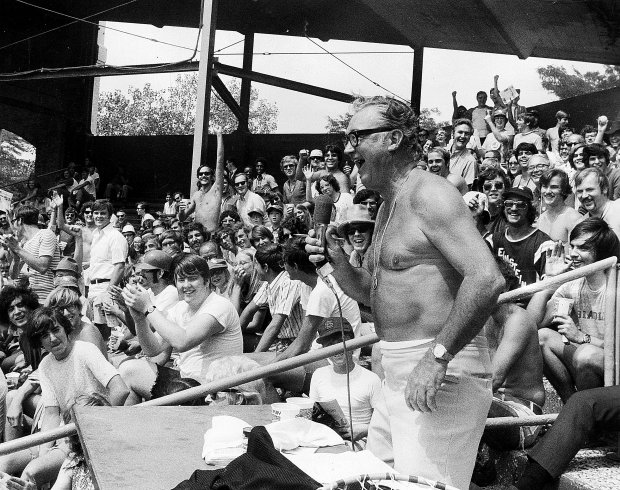
North Siders might not recall that broadcaster Harry Caray belonged to the South Side first. And Faust, too, may have instead led the North Siders in singing “root, root, root for the Cubbies.”
When the Edgebrook native attended North Park University in 1967, Faust’s then-boyfriend wrote to Cubs owner Philip K. Wrigley, asking if he would hire her to play “The Star-Spangled Banner.” Wrigley wrote back a week later to say, essentially, thanks but no thanks.
The Cubs’ loss was the White Sox’s gain.
Faust spent 41 seasons — more than 3,000 games — on the South Side, missing only a handful of games because of the birth of her son. (She might have missed another because of Eric’s high school graduation, but that game was rained out.)
She accompanied Caray’s rendition of “Take Me Out to the Ball Game” and he introduced “Nancy Faust Night” at Comiskey Park on May 1, 1979. Faust recalls it was Caray who suggested she be moved out of center field and closer to him and the fans.
What she remembers: “In the second year, Harry joined the team and he was, you know, the great promoter of every aspect of a game including the music, right? He just found anything he could say to get people to come out to the park — stuff he couldn’t get away with these days. But one of the innocent things was the music. And so, in my third year, I think due to his saying, that’s when I was brought in (behind home plate) and that’s also when Dick Allen joined the team. That’s also when they put my picture on the cover of Chicago Tribune Magazine.”
July 29-31, 1977: ‘Na Na Hey Hey Kiss Him Goodbye’
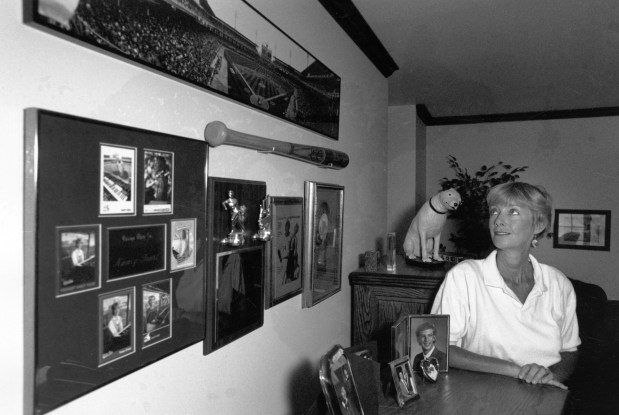
Faust is widely recognized for incorporating popular music into ballpark repertoire and for choosing songs that relate to each player based on their name, number or even their home state.
Ever chant “Na Na Hey Hey Goodbye” when the opposing team pulls its pitcher? That’s because Faust played it first.
She debuted the Steam tune during a 1977 series against the Kansas City Royals. Almost 46,000 fans showed up to the July 29 game — the largest crowd at Comiskey Park in three seasons, the Tribune reported. (That was until more than 50,000 fans showed up to the July 31 doubleheader.) The “rags-to-riches, blue-collar” Sox scored four times in the seventh inning to beat the second-place Royals 11-8 and forge a 4½-game lead in the American League West Division.
“It was the most exciting game in the history of baseball since yesterday at Wrigley Field,” Sox third baseman Eric Soderholm said. “And the game wasn’t even the whole show.”
Though the Tribune didn’t mention the tune by name, reporter Bob Verdi credited, “an ongoing sing-a-long with Nancy Faust, a continuous burp-a-long with Harry Caray, and finally, you have Jim Spencer partaking in the final out, then throwing the baseball into the stands in right field” for the energy that night at Comiskey Park.
“Weirdest night I’ve ever spent at a ball park … and the greatest,” said the Sox’s Richie Zisk. “It’s like the Christians and lions all over again. I don’t know whether the crowd comes here to watch us or we come here to watch them. Whatever it is, it’s beautiful.”
Mercury Records, which re-released the song in response to the demand created by the 1977 White Sox, gave Faust a gold record in appreciation.
What she remembers: “When I (first) played it, everybody sang along. Then I walked through the Bard’s Room (the dining area at The Rate) and someone from the press asked me, ‘What was that?’ And I said, ‘Oh, it’s a song called ‘Sha-na-na.’ That’s how well I didn’t know it. But I knew after hearing it on the radio and the word goodbye that it would be a good song if a player strikes out. So I probably jotted down C, E flat, B flat, C, just so I could remember the chords and not forget. … It just caught on and it became a theme song. And I remember management saying the next year, ‘Well, could you come up with something else now?’”
Late 1970s: Donkey chronicles
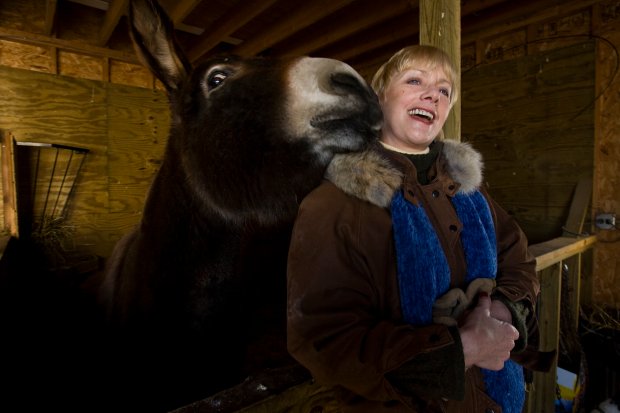
White Sox owner Bill Veeck (pronounced like “wreck”) was known for his infamous promotions. He introduced the first-ever exploding scoreboard and on Aug. 8, 1976, his players wore shorts, which were designed by his wife, Mary Frances Veeck.
As Mary Frances would later say, in admiration, “Bill introduced Bat Day, Jacket Day, Cap Day, a Music Day and many other things. He was criticized by other owners for innovations such as putting names on uniforms, but they didn’t hesitate to copy the ones that worked.”
Sports flashback: The story behind Bill Veeck’s exploding scoreboard
When no one claimed the prize — a donkey — of one of these Veeck promotions, Faust took it home. She named her Rosita. That was the first of many donkeys for Faust and her family. Mandy, her longtime donkey companion, died last year. While at her winter home in Arizona, Faust put out feelers to find a friend for her remaining mini donkey, Gigi. Now Jackpot — who was captured by the Bureau of Land Management — lives at Faust’s north suburban home, too.
“It was rounded up, captured when it was quite young, so it doesn’t display a lot of crazy tendencies,” Faust said of Jackpot.
July 12, 1979: Disco Demolition Night
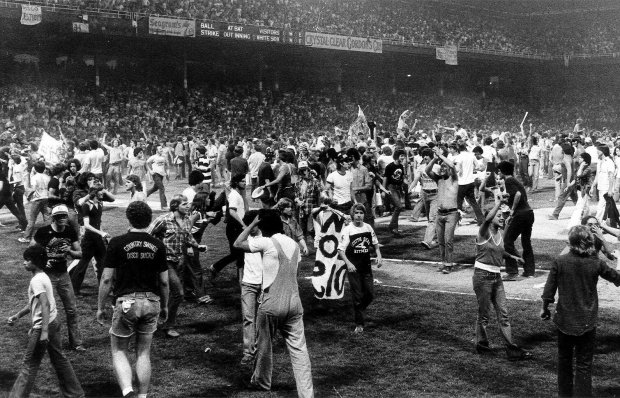
What was supposed to be a doubleheader between the Sox and Tigers turned into a debacle. The Sox lost the first game 4-1 but never got to the nightcap.
Up to 50,000 people — admitted for just 98 cents and a disco record — showed up for a promotion in which radio personality Steve Dahl took to the field between games to blast thousands of dance-themed discs into oblivion.
Disco Demolition at 40: 2 views of an explosive promotion that caught fire at Comiskey Park in 1979
Shortly after the detonation, Dahl’s fans flooded the field. Ninety minutes, 39 arrests for disorderly conduct and a half-dozen injuries later, the second game was called off. It was ruled a forfeit by the American League on Friday the 13th.
Sox owner Bill Veeck didn’t agree with the ruling, which was the first forfeit in the league in five years.
“This was a regrettable incident, but not sufficient grounds for forfeit,” he told reporters. “But we won’t go out of business because of it. It seems to me a Chicago paper ran a headline sayin’ Dewey defeated Truman some years ago. Did they go out of business?”
What she remembers: “I was playing ‘Disco sucks’ along with people chanting it until it turned unruly. I was to play ‘Do you think I’m disco’ for Steve Dahl and he just started singing it without the intro or anything. So then I just fell into place with him. I remember Bill (Veeck) pleading with the fans and how pathetic that was.
“I realized this was kind of serious when I remember looking across the field and seeing flames in the stands. So I thought, ‘Oh my goodness, this is serious.’ But, I mean, I don’t think I realized the full impact until I watched the videos more recently of it.”
Sept. 30, 1990: Last game at Old Comiskey Park
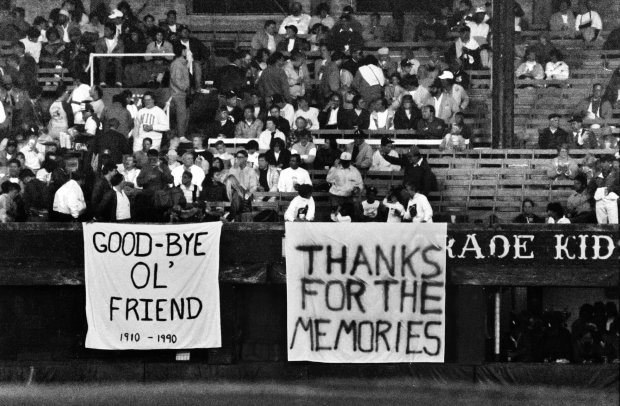
On this final day at old Comiskey Park, a crowd of 42,849 fans turned out on a glorious, sunny autumn afternoon to say farewell to what had been proclaimed the “Baseball Palace of the World” when it opened July 1, 1910. Many fans were teary-eyed, realizing that the place where they had spent so many happy times would soon be turned into a parking lot for the new Comiskey Park, which was rising just to the south at 35th Street and Shields Avenue.
“Years from now,” the White Sox ads had said all season, “you’ll say you were there.”
By the sixth inning, the Seattle Mariners were leading 1-0, but a triple by Lance Johnson, a single by Frank Thomas and a triple by Dan Pasqua put the Sox ahead 2-1. And that is how it stayed.
When it was over, after the crowd had joined Faust for a final rendition of “Na-Na Hey-Hey Goodbye” — the unofficial victory song of the Sox — veteran catcher Carlton Fisk looked out across the green grass and summed up the feelings of many others in the park. “I don’t know if I want to see it as it’s being torn down,” he said. “I think I’d rather see it now, when it’s all up, and then not see it. That way, I’ve got it in my mind what it was and what it continues to be. I have a lot of things from this ballpark, right between my ears, and I’ll keep them right there.”
What she remembers: “Of course, that will always be in my heart. That last game at the old park was the most memorable and all the emotions poured out. Also, I think the Sox were prepared for fans stealing a base or turf or whatever, but no — people just sat in the seats, shook their heads, cried and savored their last day at the ballpark. It was beautiful.”
Oct. 23, 2005: Game 2 of the World Series
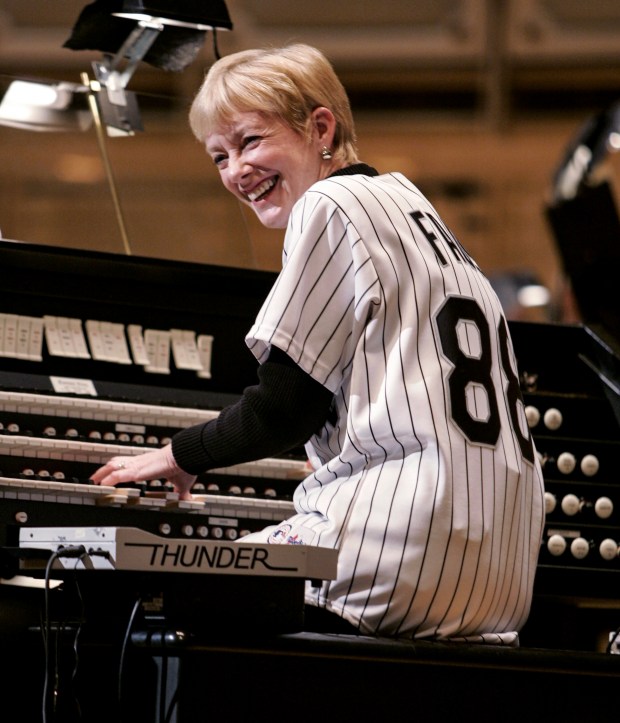
The White Sox won their first World Series since 1917 on Oct. 26, 2005, on the road at Minute Maid Field in Houston. Faust played the last home game in the series — Game 2 — three days earlier.
But what stands out most to Faust is how the city celebrated the big win.
What she remembers: “I think what impressed me most was at the rally when everyone was downtown. It was so orderly. I think all of Chicago came out for it — even Cub fans —and I was just so proud to be a Chicagoan.”
Oct. 3, 2010: Her last game at U.S. Cellular Field
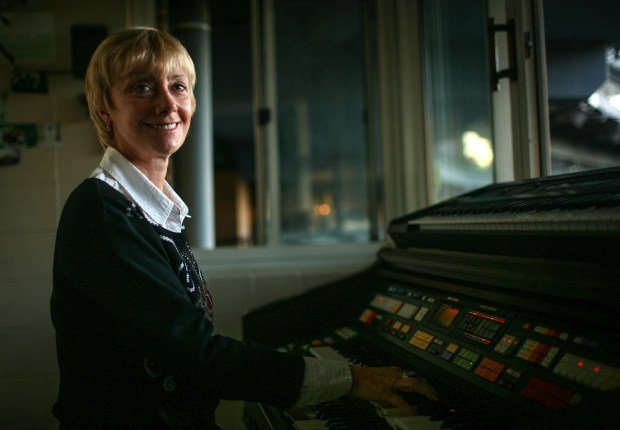
Did she ever expect to return?
“Probably not,” Faust said. “I assumed that they would hire another organist, you know? And then the baton would be passed.”
Since the age of 4, Faust has always learned to play songs by ear. In retirement, she set out to do something surprising — learn how to read sheet music.
“But, you know, as much as I try, no, it’s just not my thing,” she told the Tribune.
Faust has been dusting off her catalog. Someone on Twitter told her of their love for the way she played Michael Jackson’s “Man in the Mirror,” so she’s boning up on that one.
“I forgot that I ever did it,” she said, “so I had to learn it again.”
Faust also plans to add songs Gen Z will recognize. After hearing Chappell Roan’s “Pink Pony Club” for the first time on Tuesday, she thinks she can have it ready for her Sunday debut. Faust has also taken suggestions, including the disco-themed Dua Lipa song “Dance The Night” from the 2023 film “Barbie.”
Wait, a disco track embraced by a woman who was at old Comiskey Park on Disco Demolition Night?
“You can’t help but love that beat,” she said. “It gets into your soul.”
Want more vintage Chicago?
- Become a Tribune subscriber: It’s just $12 for a 1-year digital subscription
- Follow us on Instagram: @vintagetribune
Thanks for reading!
Join our Chicagoland history Facebook group and follow us on Instagram for more from Chicago’s past.
Have an idea for Vintage Chicago Tribune? Share it with Kori Rumore and Marianne Mather at krumore@chicagotribune.com and mmather@chicagotribune.com


